
An antibiotic is a type of antimicrobial substance active against bacteria. It is the most important type of antibacterial agent for fighting bacterial infections, and antibiotic medications are widely used in the treatment and prevention of such infections. They may either kill or inhibit the growth of bacteria. A limited number of antibiotics also possess antiprotozoal activity. Antibiotics are not effective against viruses such as the common cold or influenza; drugs which inhibit viruses are termed antiviral drugs or antivirals rather than antibiotics.

Sir Alexander Fleming was a Scottish physician and microbiologist, best known for discovering the world's first broadly effective antibiotic substance, which he named penicillin. His discovery in 1928 of what was later named benzylpenicillin from the mould Penicillium rubens is described as the "single greatest victory ever achieved over disease." For this discovery, he shared the Nobel Prize in Physiology or Medicine in 1945 with Howard Florey and Ernst Boris Chain.
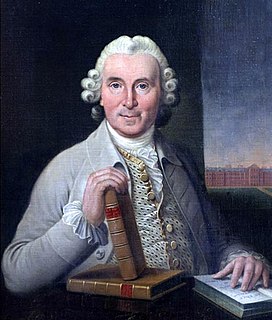
James Lind was a Scottish doctor. He was a pioneer of naval hygiene in the Royal Navy. By conducting one of the first ever clinical trials, he developed the theory that citrus fruits cured scurvy.

Penicillins are a group of antibiotics originally obtained from Penicillium moulds, principally P. chrysogenum and P. rubens. Most penicillins in clinical use are chemically synthesised from naturally-produced penicillins. A number of natural penicillins have been discovered, but only two purified compounds are in clinical use: penicillin G and penicillin V. Penicillins were among the first medications to be effective against many bacterial infections caused by staphylococci and streptococci. They are members of the β-lactam antibiotics. They are still widely used today for different bacterial infections, though many types of bacteria have developed resistance following extensive use.
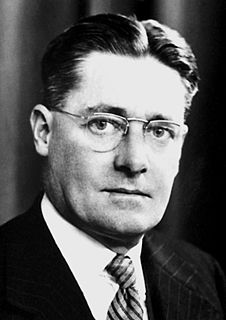
Howard Walter Florey, Baron Florey was an Australian pharmacologist and pathologist who shared the Nobel Prize in Physiology or Medicine in 1945 with Sir Ernst Chain and Sir Alexander Fleming for his role in the development of penicillin.
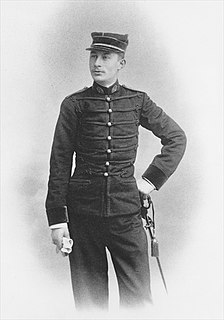
Ernest Duchesne was a French physician who noted that certain molds kill bacteria. He made this discovery 32 years before Alexander Fleming discovered the antibiotic properties of penicillin, a substance derived from those molds, but his research went unnoticed.

Sir Ernst Boris Chain was a German-British biochemist best known for being a co-recipient of the Nobel Prize in Physiology or Medicine for his work on penicillin.

Sir Edward Penley Abraham, was an English biochemist instrumental in the development of the first antibiotics penicillin and cephalosporin.

St Mary's Hospital is an NHS hospital in Paddington, in the City of Westminster, London, founded in 1845. Since the UK's first academic health science centre was created in 2008, it has been operated by Imperial College Healthcare NHS Trust, which also operates Charing Cross Hospital, Hammersmith Hospital, Queen Charlotte's and Chelsea Hospital and the Western Eye Hospital.

The history of penicillin follows a number of observations and discoveries of apparent evidence of antibiotic activity of the mould Penicillium that led to the development of penicillins that became the most widely used antibiotics. Following the identification of Penicillium rubens as the source of the compound in 1928 and with the production of pure compound in 1942, penicillin became the first naturally derived antibiotic. There are anecdotes about ancient societies using moulds to treat infections, and in the following centuries many people observed the inhibition of bacterial growth by various moulds. However, it is unknown if the species involved were Penicillium species or if the antimicrobial substances produced were penicillin.
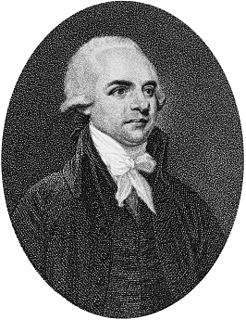
Thomas Trotter (1760–1832) was a Scottish naval physician and author who was a leading medical reformer in the Royal Navy and an ardent critic of the slave trade. Trotter was born in Melrose, Roxburghshire, and studied medicine under Alexander Monro (secundus) in Edinburgh. His major work, the Medicina Nautica, was published in 1802 and provides a detailed examination of the state of naval medicine during the French Revolutionary Wars.
St Mary's is the youngest of the constituent schools of Imperial College London, founded in 1854 as part of the new hospital in Paddington. During its existence in the 1980s and 1990s, it was the most popular medical school in the country, with an application to place ratio of 27:1 in 1996.
A cure is a substance or procedure that ends a medical condition, such as a medication, a surgical operation, a change in lifestyle or even a philosophical mindset that helps end a person's sufferings; or the state of being healed, or cured. The medical condition could be a disease, mental illness, genetic disorder, or simply a condition a person considers socially undesirable, such as baldness or lack of breast tissue.

The Faculty of Medicine is the academic centre for medical and clinical research and teaching at Imperial College London. It contains the Imperial College School of Medicine, which is the college's undergraduate medical school.

Biomedical sciences are a set of sciences applying portions of natural science or formal science, or both, to develop knowledge, interventions, or technology that are of use in healthcare or public health. Such disciplines as medical microbiology, clinical virology, clinical epidemiology, genetic epidemiology, and biomedical engineering are medical sciences. In explaining physiological mechanisms operating in pathological processes, however, pathophysiology can be regarded as basic science.

Alfred William Frankland MBE was a British allergist and immunologist whose achievements included the popularisation of the pollen count as a piece of weather-related information to the British public, speculation regarding the effects of overly sterile living environments, and the prediction of increased levels of allergy to penicillin. He continued to work for a number of years after turning 100.
Gladys Lounsbury Hobby, born in New York City, was an American microbiologist whose research played a key role in the development and understanding of antibiotics. Her work took penicillin from a laboratory experiment to a mass-produced drug during World War II.
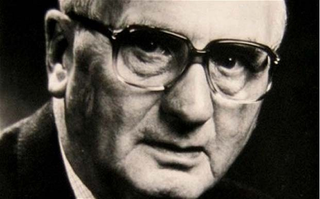
Robert Hugh Jackson OBE MC was a British paediatrician most notable for his campaign to introduce childproof packaging to medicine.
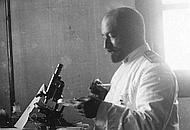
Vincenzo Tiberio was an Italian researcher and medical officer of the Medical Corps of the Italian Navy and physician at the University of Naples.
A timeline of the Imperial College School of Medicine, the medical school of Imperial College London.















